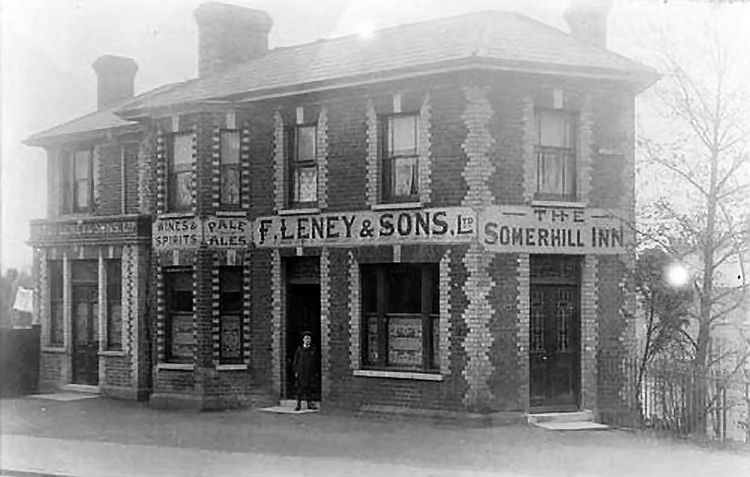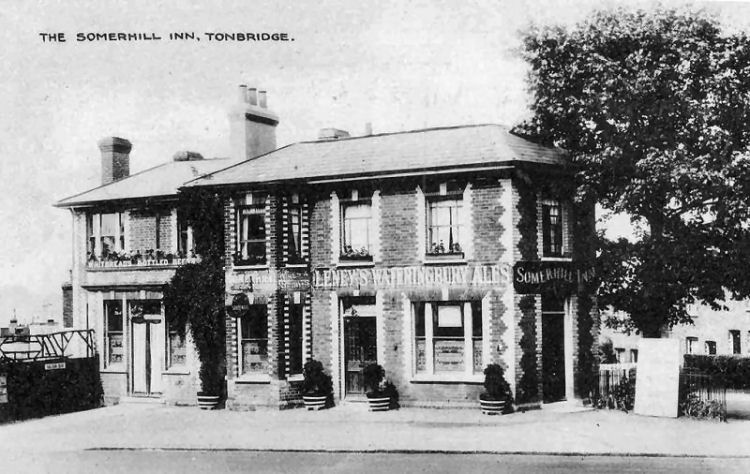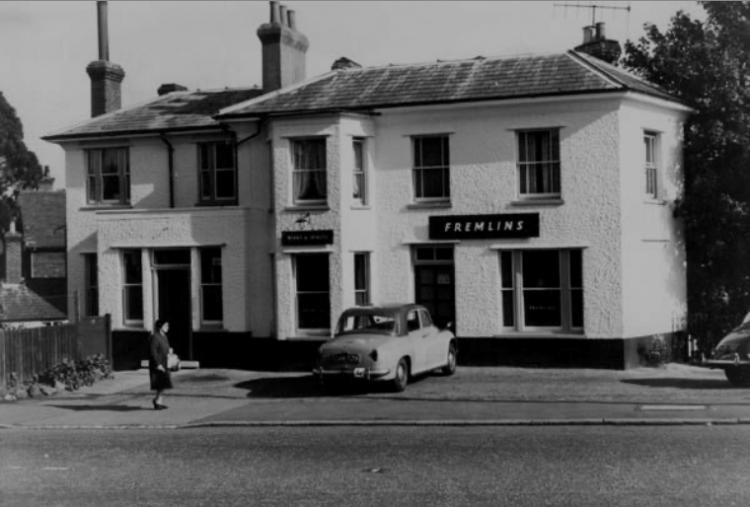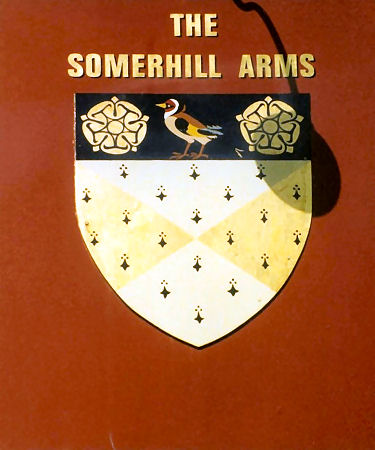|
From the Kent and Sussex Courier, 20 February, 1914.
LAUNDRY PROPRIETORS TERRIBLE CRIME.
FATHER AND THREE CHILDREN DEAD.
THE INQUEST.
St. Stephen's Laundry, Tunbridge, is an unpretentious two storied shop
and dwelling house, situated at the top of St. Mary's road, a quiet,
residential thoroughfare, with a few shops, leading out of the Pembury-road.
One can hardly associate such quiet premises with crime, but the laundry
was, as related in the special edition of "The Courier" on Saturday, the
scene of one of the most terrible tragedies that has ever startled
Tonbridge. The facts in brief are that late on Friday night James
Standen, the proprietor of the laundry, suddenly went out of his mind,
shot his three children dead, and then committed suicide.
THE TRAGEDY.
From enquiries made by a representative of 'The Courier" and "The
Gazette" it appears that Standen carried on a small but apparently
successful laundry business, known as St. Stephen's Laundry. Some nine
months ago he lost his wife, and since had engaged Mrs. Daisy Morris to
act as his housekeeper and mother his three little, ones, Jamie, aged
six years and nine months; Leslie, aged three years and three months;
and Nellie, aged three years and seven months. All the neighbours are
unanimous in the opinion that Standen was devoted to his three
motherless mites, and
therefore the terrible tragedy that occurred can only be explained by
the theory of sudden madness.
On Friday morning Standen complained at feeling unwell, and announced to
his housekeeper that he would remain in bed that day. Here it is as well
to explain that Standen and his children occupied one large bedroom. He
slept in one bed, the two youngest children another, and the eldest
child in a cot. About 8.30 on Friday evening Mrs. Morris left the house
with the intention of purchasing some supper. Standen and his children
were then in bed. Mrs. Morris met some friends, and did not return to
the ill-fated house until between ten and eleven o’clock. She was rather
surprised not to hear any sound in the house, and she at once went up to
the room where she was confronted with one of the most fearful sights
that anyone could imagine. Standen, clad only in his night shirt, lay
dead at the foot of his bed, with a ghastly wound in his chest. By his
side lay.
A TERRIBLE WEAPON.
in the shape of an unwieldy old-fashioned double-barrelled
breech-loading gun, old, and almost covered in rust, by his side. On the
other bed lay the bodies of the two youngest children, their heads
almost blown to pieces. In the cot lay the body of the elder boy, also
with terrible shot wounds in his head. Apparently Standen had shot the
little boy and girl while they were asleep, re-loaded the gun with two
fresh cartridges, shot the elder boy, and then placed the muzzle against
his chest, ending his life in a fearful manner. Death must have been
instantaneous in each case.
The distracted housekeeper at once rushed to tell the neighbours what
had happened, and they immediately informed the Police. Inspector
Cheeseman, P.C. Excell, and another officer at once hastening to the
scene of the tragedy. Dr. Watts was also summoned, but he could only
pronounce father and children to be dead. The bodies of the murderer and
the three child victims were then conveyed to the mortuary to await the
inquest, which was held on Monday.
SAD MARRIED LIFE.
Standen's short married life appears to have been overshadowed with
sorrow, and it is believed the awful crime on Saturday was the result of
constant brooding over his troubles. As far as can be ascertained he
appeared to have no business troubles.
About six years ago he was driving his wife in a trap when he met with
an accident. Mrs. Standen was pitched out of the trap, and unfortunately
alighted on her head, sustaining nasty injuries. After a short illness,
she recovered. Subsequently, however, trouble again visited the family,
Mrs. Standen dying from pneumonia in the infirmary about fifteen months
ago. Standen has never been the same man since this sad domestic
trouble, and, according to the stories of his neighbours, he has been
constantly brooding over his troubles. On several occasions he has
spoken to neighbours about suicide, and there are also rumours that
lately he has given way to drink, while others state that his manner has
been very strange.
A LETTER.
A letter was left for Mrs. Morris, and was read at the inquest. It was
very hastily written, and appeared to have been folded while the ink was
wet. The contents of the letter are as follows:—
'Dear Daisy,
This is
for anyone to know I leave everything belonging to me to you. I hope all
will forgive me for what I have done. Don't stop in Tonbridge, where all
these wicked people live. I will meet you in Heaven. My hand is not
firm, but my gun will put this right. Trusting this will not make any
difference to anyone else.
James Standen."
THE INQUEST.
The inquest was held at the Fire Station on Monday afternoon by the
Deputy Coroner, Mr. B. H. Levett. Mr. P. L. Babington was chosen Foreman
of the Jury.
The first witness was Daisy Morris, housekeeper to deceased. She stated
that she was a widow, and had been acting as housekeeper to Mr. Standen.
She first came in contact with Standen when she was seeking employment.
He did not give her work at his laundry, but he told her about the loss
of his wife and his motherless children. Eventually she agreed to become
his housekeeper. Witness identified the whole of the bodies.
The Coroner-. What was Mr. Standen's health like?
Witness:- He was a
strong, healthy man, and I never knew him to suffer from any illness,
but at times he was the worse for drink, and was rather strange.
Did he drink much?
He did when I first went there, but until a week
before Christmas I had never seen him the worse for drink. Last Tuesday,
however, he was away all day, and came in the worse for drink.
What was he like?
He appeared worried about his business.
He had lost his wife, I believe?
Yes, he used to worry about that, but
he used to say the wife was more comfortably off, as for four or five
years she had suffered from fits.
Was he fond of his children?
He was passionately fond of them.
He was the worse for drink, I think you said on Thursday?
Yes, he was;
but he seemed to get better in the evening, and he went to the pictures
together.
What was he like on Friday morning?
He called me in, and said he should
stop in bed. I said, "I suppose it is the drink? and he replied, "Yes, I
suppose it is."
Did he ask you for drink on Friday?
Yes, he did, but I said I should
not go out for it. He replied, "There is no need to do that, as I have
some here." I then noticed a half-bottle of whiskey by the bed, and went
to make a grab at it, but he was too quick, and snatched it away, hiding
it under the bed. On Friday evening I found that the bottle was empty.
Had he ever appeared worried?
Yes, he said he should end his life
sometimes. I think he was principally worried about his business.
Was it about the business?
Yes, I think so. He said something about
there always being the gun, when everything else failed.
What time did you put the children to bed on Friday?
About a quarter to
eight.
Was Standen asleep?
His eyes were shut, and I thought he was asleep. As
I was going out, I noticed his eyes were half opened. I asked him how he
was, and he said, "I feel rather tired. I think I will sleep."
Then you went out?
Yes, he said, "Good-bye, dear." I said. "Don't say
good-bye." He sad, "All right then, so long."
Did you think you would never see him again?
Oh no, he always used to
say, "Good-bye," to get me to say "Don't say good-bye." He then used to
smile, and say, "so long."
What time did you return?
About 10.15 to 10.30 p.m.
Did you hear anyone about?
No, I heard no sound. I went upstairs to the
bedroom, but it was locked, and I called out, "Let me in, Jim." There
was no answer, and I said, "Sonny, what is the matter with dad?" I then
burst the door open, and I saw Mr. Standen lying dead at the foot of his
bed. I then went across to a neighbour's, and her husband informed the
Police.
Had you seen the gun before?
It was always there, ever since I had been
there. It was kept in the sitting room.
Did you see it on Friday?
Yes, it was in two pieces, on a sheet of
paper. Mr. Standing had been cleaning it.
Did he ever say what he used it for?
He said he used it for shooting
rabbits, and that he had
PLENTY OF CARTRIDGES.
Did he say he was ill an Friday?
He said, "I am right down ill." I said,
"I suppose it’s the drink?" He said, "Yes."
How was the business?
It did not seem to get on as well as it might have
done. It brightened up last month, however.
Could the children get the gun?
No, they were too small to carry it.
Did you see anyone about the house when you returned?
No, the place was
quite empty.
By the Foreman:- Mr. Standen was only strange in his manner after the
drink. He seemed queer after a drinking bout.
Mrs. Dann, an employee of the laundry, was the next witness, and he
stated that Standen never asked for drink on Thursday. On Friday morning
he seemed a little the worse for drink.
She went up to his room and said, “This won't be right, boss. What’s the
matter?" He said, "I am rotten." In the evening she went and got him a
glass of beer about 8.15 o'clock. She sat talking with him, and left him
about 8.15. "The little drop of beer I gave him," added witness, would
not hurt anyone."
The Coroner:- Had you any conversation with him earlier in the day?-Yes,
about the work. He said that Mrs. Morris could come down with me, and
that he would be down in twenty minutes.
Mrs. Morris:- I beg pardon. That in a lie.
A LAST DRINK.
Herbert James Corner, landlord of the "Somerhill Inn," deposed that he
had known Standen for some time. "On Friday evening," continued Mr.
Corner, “he came in my house between 9 and 9.30 p.m., and called for a
half-quartern of gin. He drank this up. I should say he was in my house
from two to two and a half minutes. He did not take any drink away with
him."
The Coroner: How far is your house from deceased's?—Witness: About seven
minutes' walk.
Did he strike you as a men who had just got up from a sick bed?— No, he
was fully dressed, the same as I have seen him dressed nine times out of
ten.
Lily Haynes, St. Mary's-road, deposed that she lived next door to
Standen. “On Friday night," she stated, “I heard two shots, between 9.30
and 10 p.m."
The Coroner: How many?
Witness: Three, and then something dropped.
Was there an interval between them?
Yes, about the same between each.
What did you do then?
I called my father, and he said it was only the
wind.
I suppose you often heard bangings in the laundry?
Yes.
P.C. Excell said he was called about 11 o'clock by the witness Morris.
He went to the house and found the father and three children dead. He
also summoned Inspector Cheeseman and Dr. Watts.
BOTTLES OF SPIRITS.
Inspector Joseph William Cheeseman stated that he was summoned to the
house. He found the body of Standen laying at the foot of the bed, with
the gun beside him. The two youngest children were lying close together
on a bed, their heads being practically blown off. The eldest boy was
laying in another bed, and his head was also practically blown off.
Witness found an empty bottle beside the bed. It smelled strongly of
whiskey. There was another bottle, which smelled of brandy, but witness
had not been able to trace this bottle. There were several documents in
the room, and a letter addressed to Mrs. Dann. There was a bank book
with no balance in it, and 17s. 4d. in cash in the house. The letter; as
given above, was then read. Witness’s theory was that Standen leaned on
the gun, and then pulled the trigger. He should think that the children
were shot while asleep.
Dr. Watts, who was also called after the tragedy had been discovered,
gave evidence as to the injuries of the father and the three children.
Nellie, the youngest, had the left side of her head blown away, her
brains being spattered over the bed. Leslie had the whole of the right
side of his head blown entirely away, the brains being scattered over
the bed and floor. James had a large gun-shot wound in his head. The
father had a large gun-shot wound in his chest. A post-mortem
examination had been made, and it was found that the liver and the upper
part of the stomach had been shot away. The wads and some shot were
found in the abdomen. The deaths of the children must have been
instantaneous, but the father probably lingered a minute or two after
shooting himself. The deaths in all four cases were caused by
haemorrhage and shock from gun-shots.
Horace Standen, of Tonbridge, deposed that he was uncle to the father.
Standen had an uncle who shot himself about two and a half years ago,
and witness had a sister who had been in an asylum for 40 years. Witness
did not now much about Standen, but did not consider that he was strange
in his manner.
THE VERDICT.
The Coroner, having summed up the evidence, the Foreman intimated that
their verdict was as follows:— "James Standen is guilty of the murder of
his three children, but in regard to the act on himself, there is not
sufficient evidence to show what his state of mind was. The Jury are
agreed, however, that he committed suicide."
THE FUNERAL.
The funeral of James Standen and his three little children took place
yesterday (Thursday). The two hearses, the first containing the father,
and the second the three little violet and white coffins, with the
mortal remains of the unfortunate children, left the mortuary in the
early afternoon, en route for Pembury, where the interment took place. A
large crowd of curious spectators assembled in the immediate vicinity of
the Fire Station but there were no hostile manifestations, the crowd
standing reverently as the cortege passed by. There was only one
carriage of mourner, and there were no flowers or wreaths of any kind.
|




